How To Create A Church Budget: The Complete Guide

A church budget is where faith and fiscal responsibility meet to create something truly extraordinary.
In this comprehensive guide, we will unravel the art of crafting a church budget - a blueprint not just for dollars and cents, but for disciplining your members and advancing God's Kingdom.
Whether you're a seasoned church leader or a newcomer, this complete guide is all you will need to build a sure financial foundation for your church. Together, we will uncover the secrets to a successful church budget that goes far beyond numbers and into the heart of your ministry.
What Is A Church Budget?
A church budget is a financial action plan for your church. It creates clear financial goals, holds the church accountable to those goals, and plays a crucial role in the financial health of your ministry.
Why A Church Budget Is Essential?
Let's start at the beginning: Why is a church budget essential?
A budget will show you where money comes in and where it is spent. The benefit of a budget for your church is better financial stewardship.
Creating your church budget is critical for planning church activities, managing church expenses, and maintaining assets like a church building. You have to know what money your church has at its disposal as you plan upcoming events and ministry opportunities.
Proper stewardship of your church's financial resources will allow you to take your ministry further and do more for the Kingdom!

What does the Bible say about a church budget?
The Bible isn't silent on how churches and church leaders should handle their finances.
The Bible says the church should:
- Pay its teachers (Gal 6:6)
- Pay for evangelistic and missionary work (Phil 4:15-16)
- Give to the needs of the poor (Deut 15:11)
- Lead in both spiritual and financial matters (Acts 4:32-37)
- Handle money in a way that is defensible against any accusation (2 Cor 8:18-24)
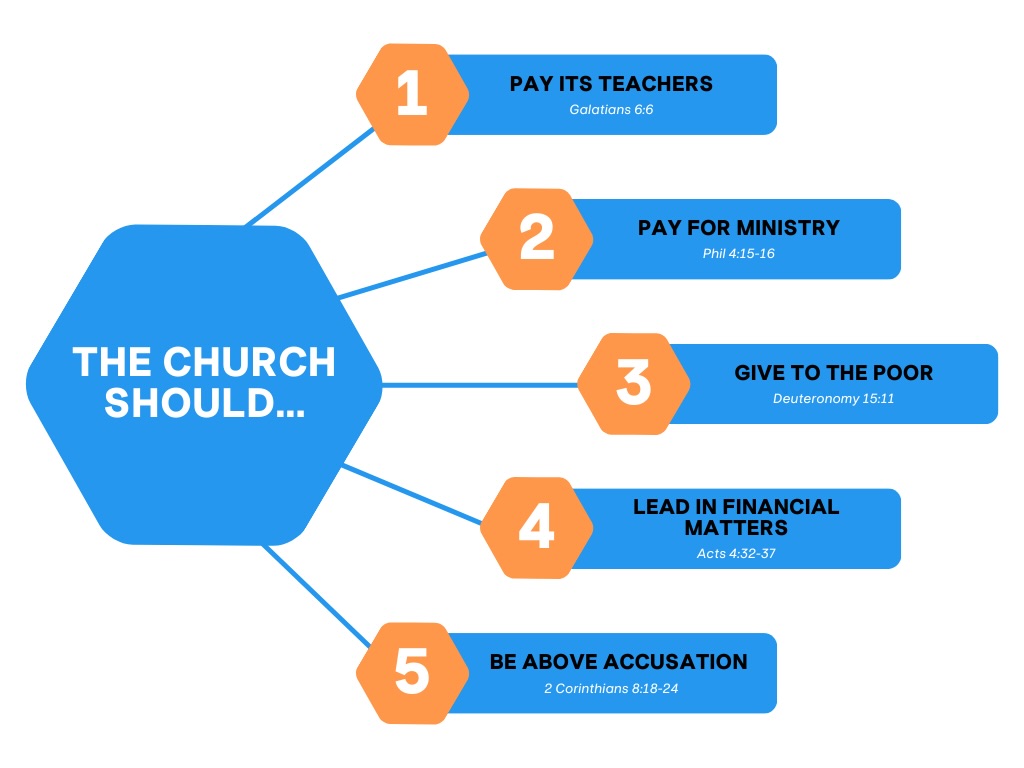
The 4 Types of Church Budgets
Just like no two churches are the same, no two church budgets are exactly alike! There are actually multiple types of church budgets you can use for your ministry.
Read these descriptions to learn more and see if these can help you plan your church finances:
1. Line-Item Budget / Incremental Budget
A Line Item Budget is the most common church budget type. This approach lists every expense and income stream, with projections for how much each will cost or bring in.
It's also called an Incremental Budget because each year's budget is built on the previous year's budget, meaning only incremental changes are made from one year to the next.
2. Program Budget / Value Proposition Budget
The Program Budget method evaluates each program the church plans to offer, how much it will cost, and what other resources it will require. This budget will help you remove inefficiencies as you realize which programs are no longer as effective as they once were.
The benefit of the Program Budget method is that it helps churches avoid incremental bloat, forcing leaders to justify each program and its associated expenses.
In the world of business, this one is called a Value Proposition Budget.
3. Zero-Based Budget
A Zero-Based Budget is a method of budgeting where all expenses must be justified. Every expense item starts from a "zero base," or $0. Every function within the church or ministry is analyzed for its needs and expenses. The budgets are then built around what is needed for the upcoming year, regardless of whether each budget is higher or lower than the prior year.
This one is great because it encourages optimizing costs instead of just income. Each leader has to consider how each dollar is spent, rather than incrementally adding to the previous year's budget.
4. Participatory Budget
A Participatory Budget is a member-sourced approach to budgeting, where church members collectively decide how to allocate monies through a process of democratic decision. Instead of church leadership creating the budgets, members evaluate and vote together on each item.
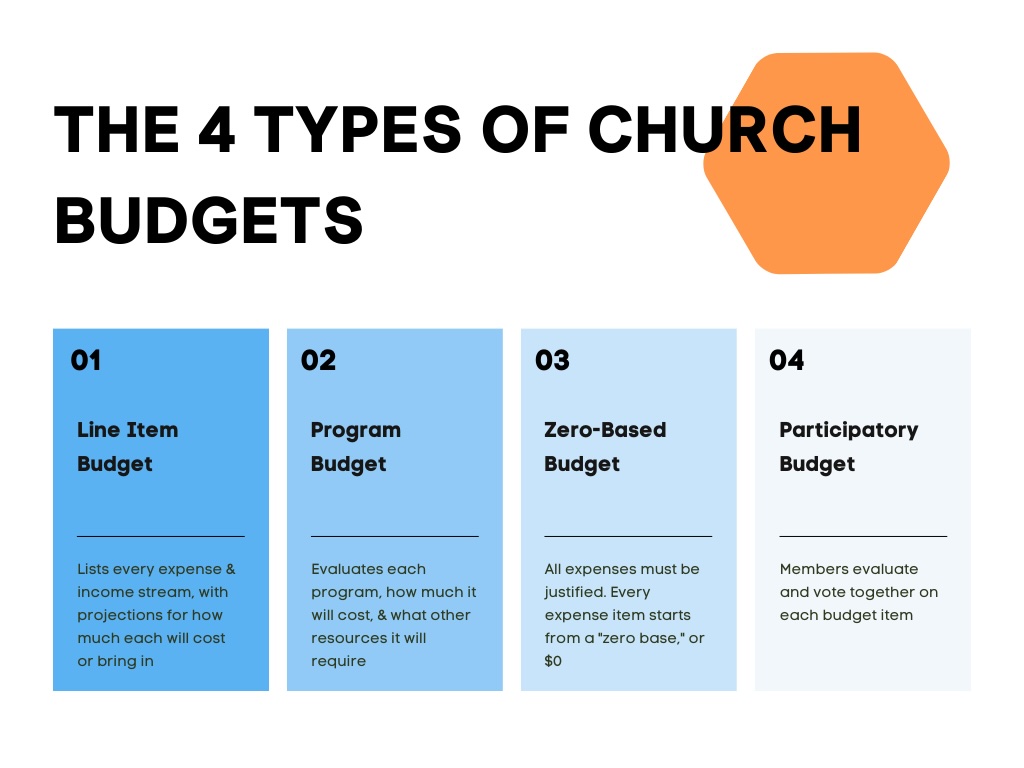
What type of budget is best for my church?
Which one is best for your church depends on your needs and leadership style. However, most churches would benefit from a Line Item Budget. However, it would be wise to employ the strengths of the other budgets mentioned above to avoid the common pitfalls of Incremental Budgets.
What Are the Steps To Creating A Church Budget?
Now that we know what a church budget is, why it's important, and what types of church budgets you can use, let's tackle the big question: What are the steps to create a church budget?. Matt and I discuss all of this in this video...
Below are the steps to create a budget for your church:
1. Assess Your Church's Financial Health
To begin, you have to know your church's overall financial position. Think of it as measuring your church's net worth.
To do this, you have to measure two things:
Your church's total assets
From the start, you have to know your church's total asset package.
First, log into your church's bank account and add up the total between all savings and checking accounts.
Your church may also own land and buildings, have a large endowment, a money market account for the pastor's retirement, etc. Gathering this information will require that you collect all financial statements and reports you can get your hands on.
Your church's total liabilities
Next, add up all of your church's debts.
This means counting your mortgage payments, the car payments for the church van, the loan taken out to repair the roof, etc.
Once you have your church's financial position, there are two more things you need to do:
Identify sources of income
You don't need to forecast income here. You only need to know what the primary sources of revenue are for your organization.
For most churches, these sources are:
- Tithes
- Offerings
- Annual fundraisers
However, your church may have a unique income source. An endowment or a church planting grant could be listed here as well.
Identify fixed and variable expenses
Now list all expenses, both fixed and variable. For everything your church spends money on, add it to your list of expenses.
You don't need to measure the expenses or make any projections. You're just identifying the main pathways money takes out of your organization.
2. Calculate your Budget Baseline
Now that you've identified all of your sources of income and expenses, it's time to put that knowledge to use. Now we need to calculate your budget baseline.
Your baseline starts with the income your ministry has brought in from the previous year. If you have been recording all church income throughout the years, now is the time to review that data. Run reports on the past or current year, 3 years, and 5 years of income.
First, add up all of the income your church brought in last year.
Next, subtract all of last year's expenses from the income you just calculated. The total of last year's income minus last year's expenses will give you your Net Position. Ideally, this number is positive. If your Net Position is negative, it means you've spent more than you brought in.

Once you have your Net Position, add Last Year's Income to your Net Position to calculate your Budget Baseline. This budget baseline is your predicted income for next year.
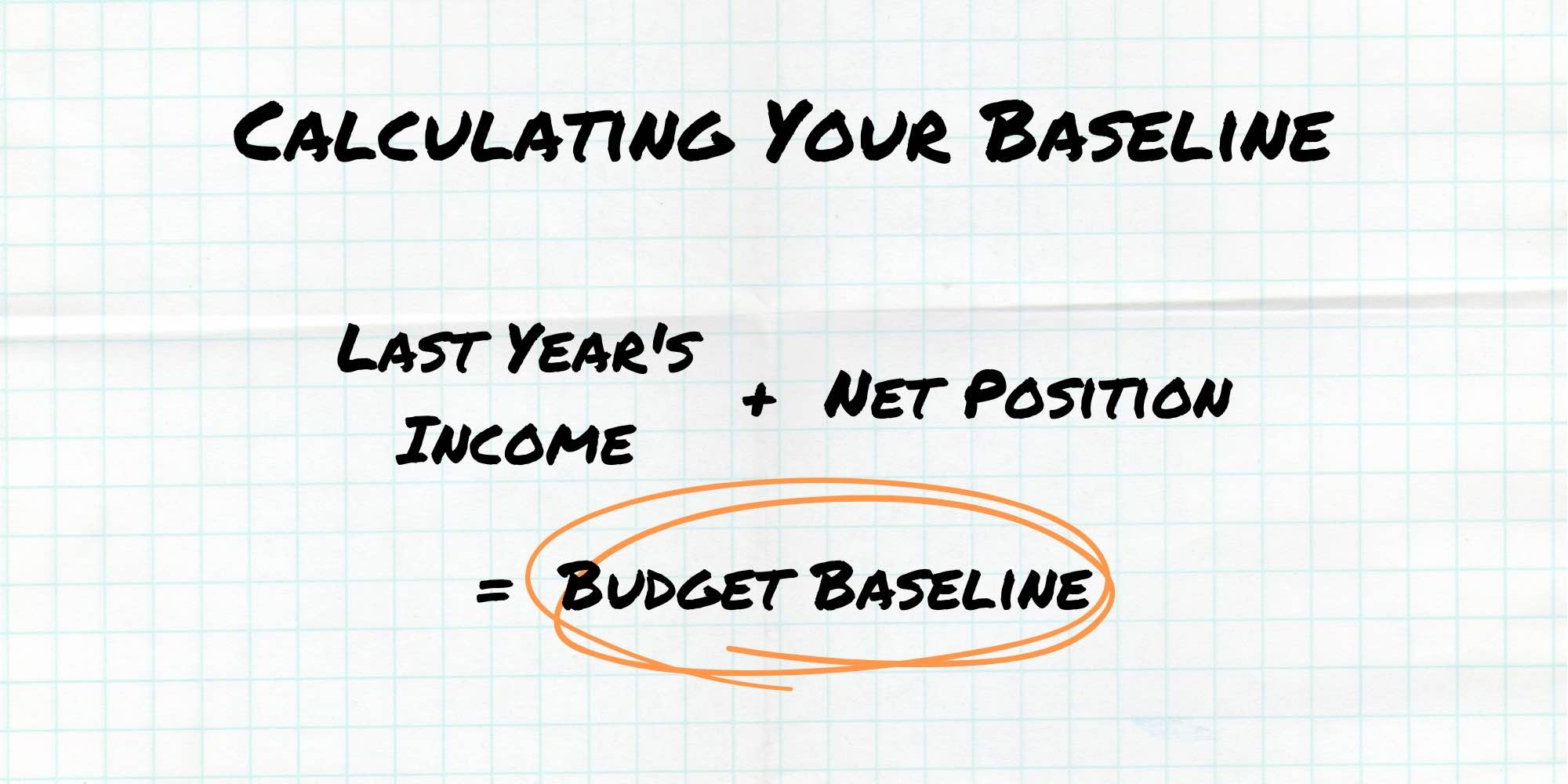
3. Forecast Income and Expenses
Now that you know your church's overall financial health, it's time to dig into the details.
Here's what you need to do to forecast income and expenditures for your church:
Project future income
You already have this projection thanks to calculating your budget baseline. This also works as your projected income for next year.
Anticipate increasing expenses
Just like forecasting future income, we have to predict future expenses. But we have to go further - we have to predict how those expenses will grow next year.
This can look like:
- Inflation
- Church growth
- Hiring more staff
- Expanding marketing efforts
This step is where many leaders start feeling anxious. Seeing expenses mount can feel overwhelming. But take heart! Your expenses aren't the whole picture. This is just one part of the whole puzzle.
Also, this aspect of financial planning is why it's so important for churches to offer online giving to their members so those members can establish recurring giving. This takes so much of the guesswork out of forecasting income as well as helps increase overall giving, offsetting those increasing expenses.
Start an emergency fund
We pray God blesses your church with smooth financial seas ahead. But the reality is that emergencies happen. It's only a matter of when.
Start an emergency fund at your church. Ideally, your church should have 3-6 months of operation expenses set aside in a rainy day fund. Each month, set aside 5-10% of your church's income into the emergency fund each month to build it up. If you get to the 6-month goal, consider building it up to 12 months!
Though we trust God with our finances and future, wisdom demands we prepare the church for emergencies.
4. Prioritize Expenses
Prioritize expenses based on importance and urgency.
Analyze the past few 3-5 years of expenses at your church and see where you have been spending most of your money. These are likely the highest-priority expenses, ones that you would maintain even in times of financial hardship. Of course, this is also a great time to ask if these expenses are worth the cost. You might consider reducing expenses or making budget cuts to help save your church money.
If this is your first time creating an annual budget for your church, you may not know exactly which expenses are the highest priority. Your first year will likely be a year of discovering how to prioritize them. However, it's still worth the time to consider what expenses should be top priority and which can be set aside in times of financial strain.
This is where a Program Budget or Zero-Based Budget really shines. Even if you choose to implement a Line Item Budget, it may be worth the effort to run an informal Program Budget. This will force you and your leaders to evaluate the necessity of each program, rather than carry them over from year to year.
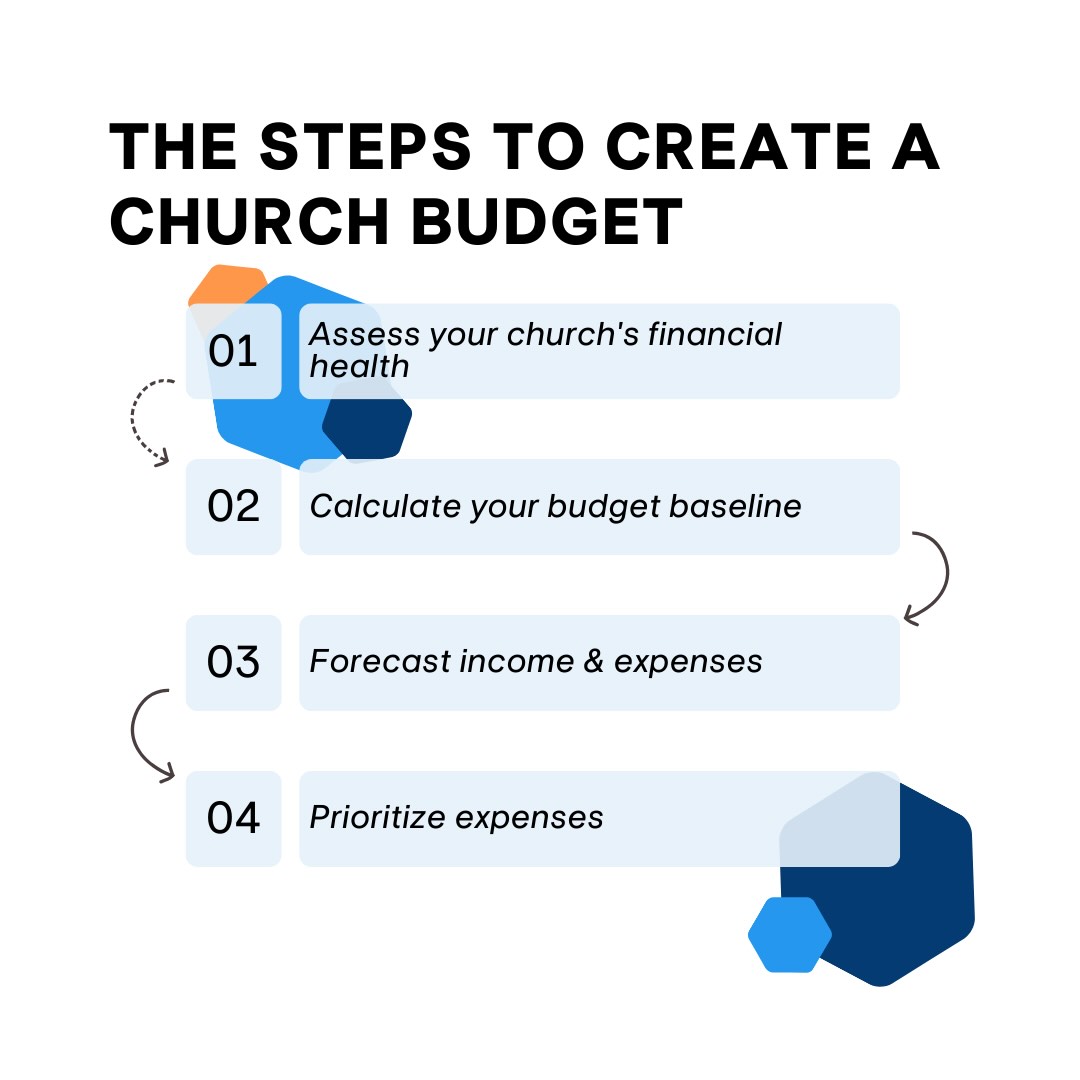
What Should A Church Budget Include?
Every church's budget will be unique. But these are what you will likely need to include in your budget:
- Income
- Personnel salaries
- Administration costs
- Operation costs (i.e. maintenance, utilities, insurance, etc.)
- Debt Payments
- Outreach costs
- Church Program costs (i.e. children's ministry, women's ministry, elder care ministry, etc.)
- Church Growth funds
- Emergency Fund
Some churches may need to include other line items than the ones listed above. If your church has a school, coffee shop, merch store, bookstore, community center, or other additional programs, you will need to account for those things in your budget.
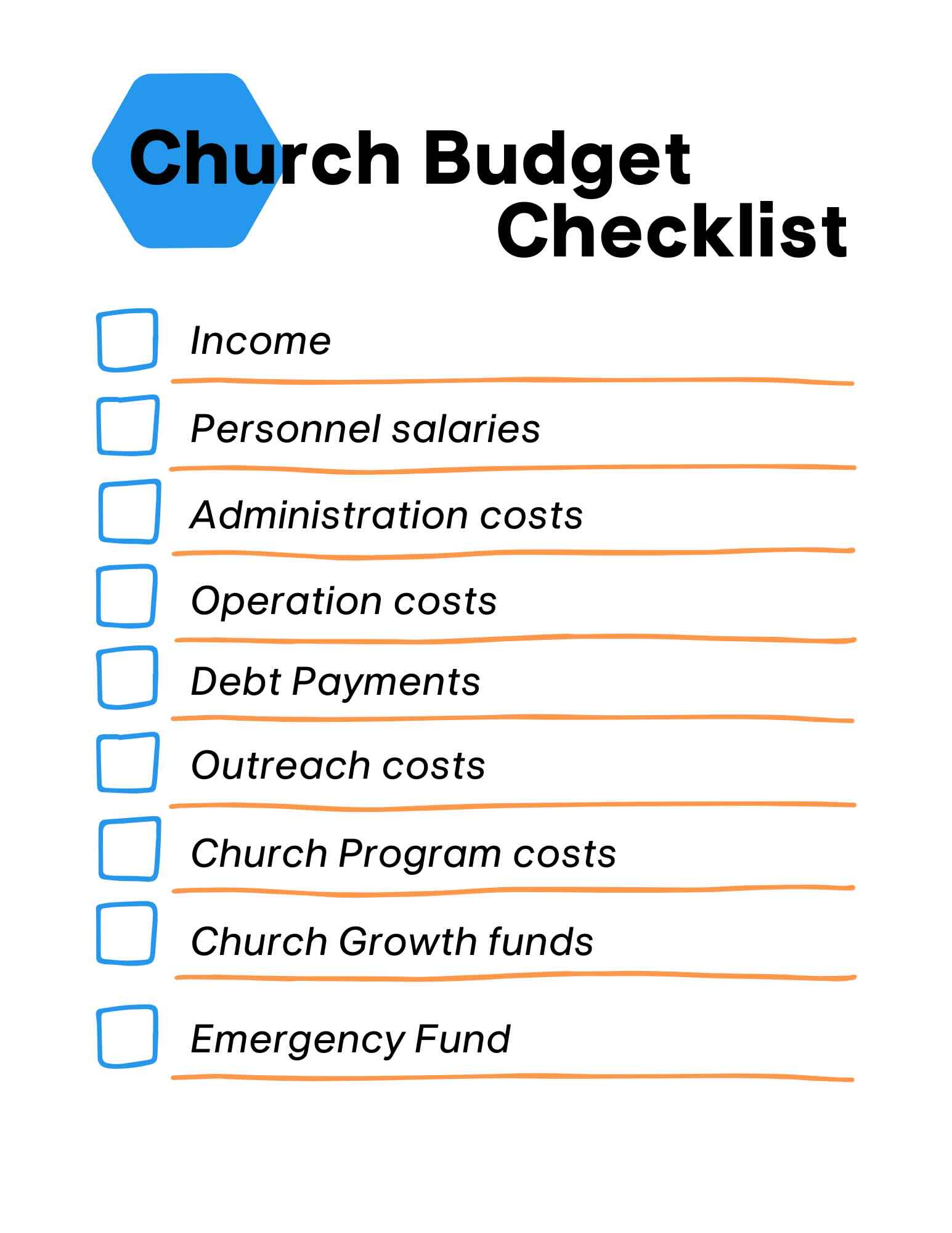
Setting Clear Financial Goals
Now that you have evaluated your past data, and your present financial health, and made future projections, it's time to establish some financial goals.
Short-Term vs Long-Term Goals
Because creating a budget involves making projections about future income and expenses, this is a natural time to set goals for your financial future.
Short-term goals can cover things like:
- How much you want to see income increase
- How much you want to grow your ministry funds
- How to reduce expenses
- How aggressively to pay down debts
Try to create financial targets for the next 6 months, 1 year, and 3 years. Even if you don't hit those targets as soon as you plan, having targets will help you accomplish those goals!
Some financial goals can be viewed in both the short and long term. For example, church growth is an evergreen focus, meaning you can have 6-month goals and 10-year goals. There are costs that come with that, so making plans will keep you prepared.
Other goals will require you to think long into the future. Whether you own a building that needs to be maintained or are saving up to buy a building, you will need to save a lot of money over many years to be ready.
Financial Mission and Vision
Make sure your financial goals are always aligned with the church's mission and vision.
At every step of the process to create your budget, your church's mission and vision should be the main focus. It's easy to get lost in the weeds. But the whole purpose of creating a budget is to help your church live out its purpose.

Involve Key Stakeholders
<Your church may have elders, a board, be member-led, or have a denomination to report to. Who you consider a stakeholder depends on your church's leadership structure and denominational requirements. Regardless, it's important to keep them in the loop on every budgetary decision.
Transparency and accountability are probably the most important tools to maintain your ministry's integrity. That means making the finances of your church an open book for your church community to read.
Using church management software that includes church accounting will make this process easy. It's as simple as running a report on the data you already have.
Once you have your reports, host regular budget meetings and discussions with everyone necessary, including the congregation. This lets them know their donations are being used wisely and that you have the church's best in mind.
Review and Adjust Regularly
After all the work you've done building your budget, you're only halfway done!
Your new budget won't work in the first few months. That's okay! No budget works perfectly right out of the gate.
It's important to create a review process to keep the budget functional.
How often should I review the church budget?
Review the budget monthly or quarterly. Budgetary considerations can't be just an annual thing. A lot can happen in a year, so it's best to regularly monitor the budget and the finances so you can make adjustments.
It also allows you to celebrate milestones! If you have set financial goals, reviewing your budget regularly helps you see when you achieve those goals. Yay!
Utilizing Budgeting Tools and Resources
You don't have to walk this path alone. There are great resources to help you along the way!
9Marks has free downloadable checksheets that help you think through your programs and budgets.
Also, if the church accounting software you use hosts regular training or webinars, definitely take advantage of those opportunities to make sure you're getting the most out of the software.
A financial advisor or consultant may also be worth the price tag. Having an expert will take much of the guesswork out of budgeting for a church, especially as you're just getting started.
Creating a Culture of Generosity and Stewardship
In my experience, just talking about giving and recurring donations doesn't move the needle. The most effective way to get more people to adopt recurring giving is to have volunteers available to assist members in setting it up. Let members know they can go talk to those volunteers before and after service and they will be glad to walk them through the steps.
Regularly encourage tithing and offerings as an important practice in members' daily walk. If your online giving platform offers recurring giving, help members set that up.
Also, it may help to provide financial education resources to the congregation.
The next best way to create a culture of generosity is to put fun back into "fundraiser!" Hosting regular fundraisers as fun events for your members is the best way to form a tight-knit community that supports the mission of your church.
Church Budget FAQs
What should be included in a church budget? - All income, personnel salaries, administration costs, operation costs, debt payments, outreach costs, church program costs, church growth funds, and emergency fund
What are the 5 questions I must ask when creating a church budget?
- What is our income?
- What are our expenses?
- What is our debt?
- What are our priorities?
- Is this sustainable?
How do you balance a church budget? - If you can, budget off of 80-90% of your church's income and save the rest. Just like it's important for a family to live within their financial means, your church needs to operate within your income.
What are the major expenses of a church? - Personnel, facilities, and rent/mortgage take up the majority of most church budgets. However, the goal should be that no less than half of your expenses be for internal and external ministry work.
Should a pastor be in charge of church finances? - While your pastor should be involved in major church financial decisions, it's best for his reputation and the integrity of the church that he not be the one directing the budget. Your pastor needs to segregate that duty to a trusted person who is experienced in church finances.
What does a healthy church budget look like? - First, a financially healthy church is not spending more than it takes in. Their expenses are below their income. Also, A healthy church budget makes room for an emergency fund and saves money for church growth to prepare for the future.
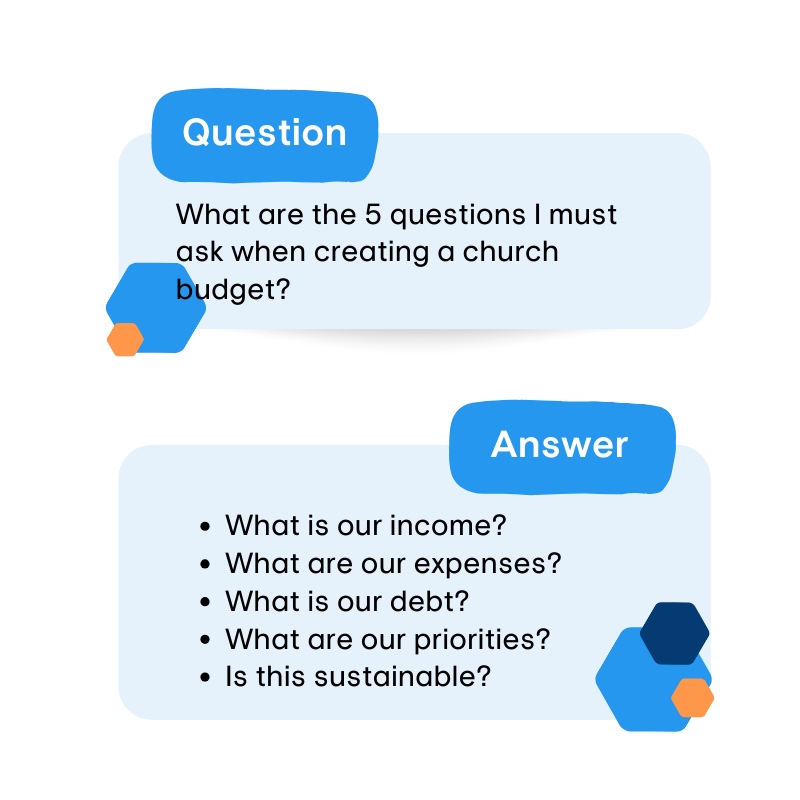
Church Budgeting Tips
Take these tips with you as you embark on your quest to set up a church budget!
- Have all church leaders review next year's budget before finalizing
- Set realistic financial goals
- Maintain transparency and accountability
- Regularly review the budget
- Keep in mind that the budget can be adjusted as needed. This isn't set in stone!
Create a Budget for Your Church
Every church needs a budget. A church budget will help you steward the resources God has given your church, helping you do more for the Kingdom. Having a budget helps advance your church's mission and support your community.

|
Lorri
|